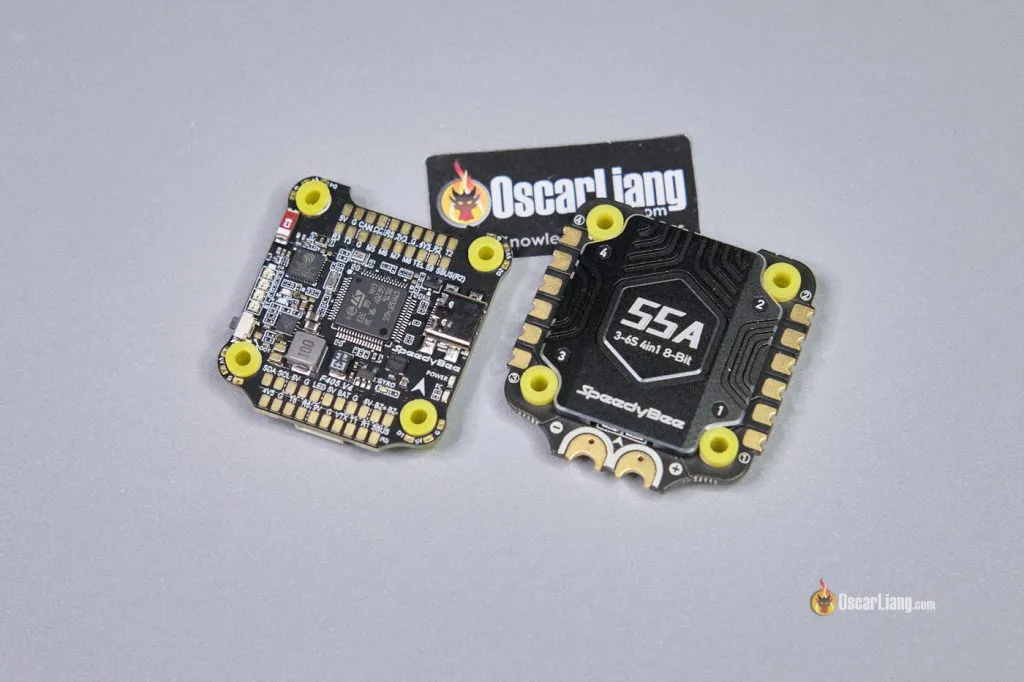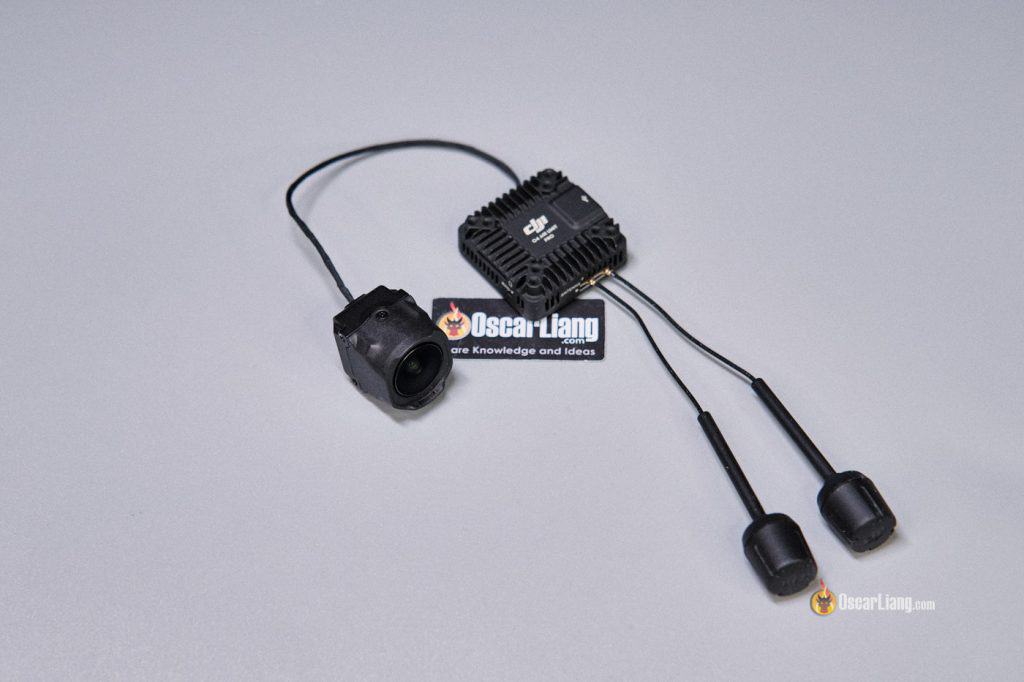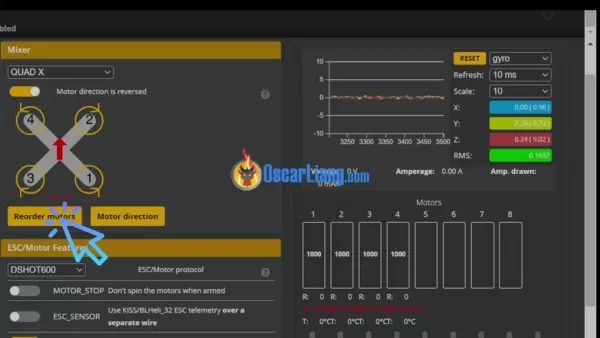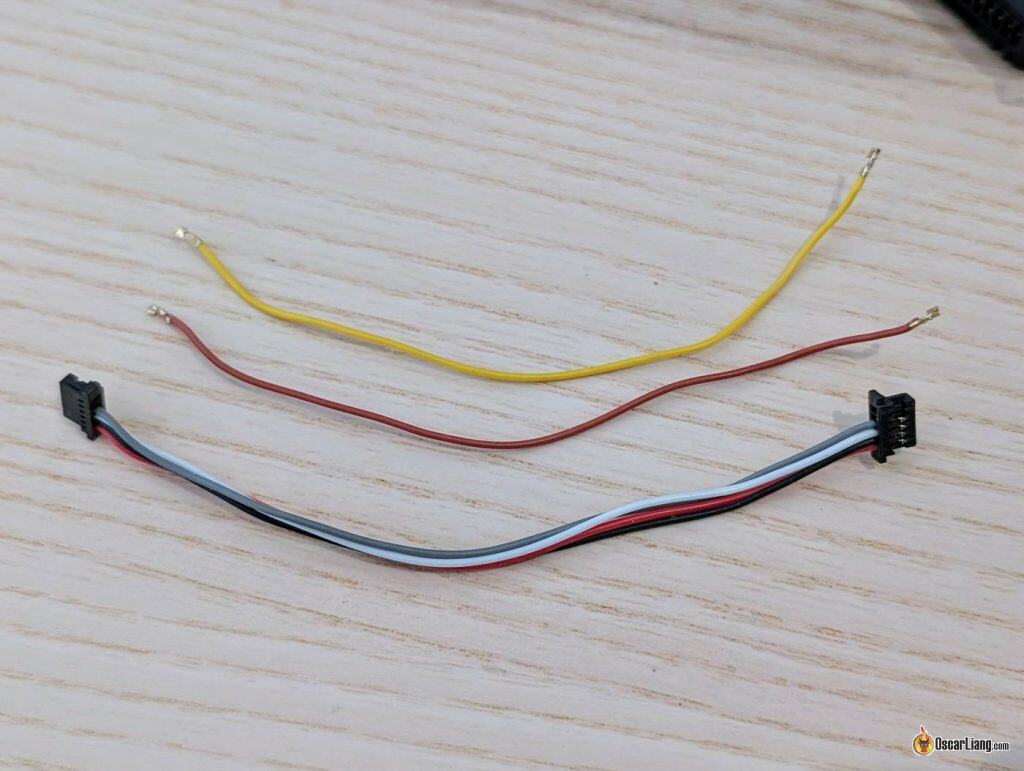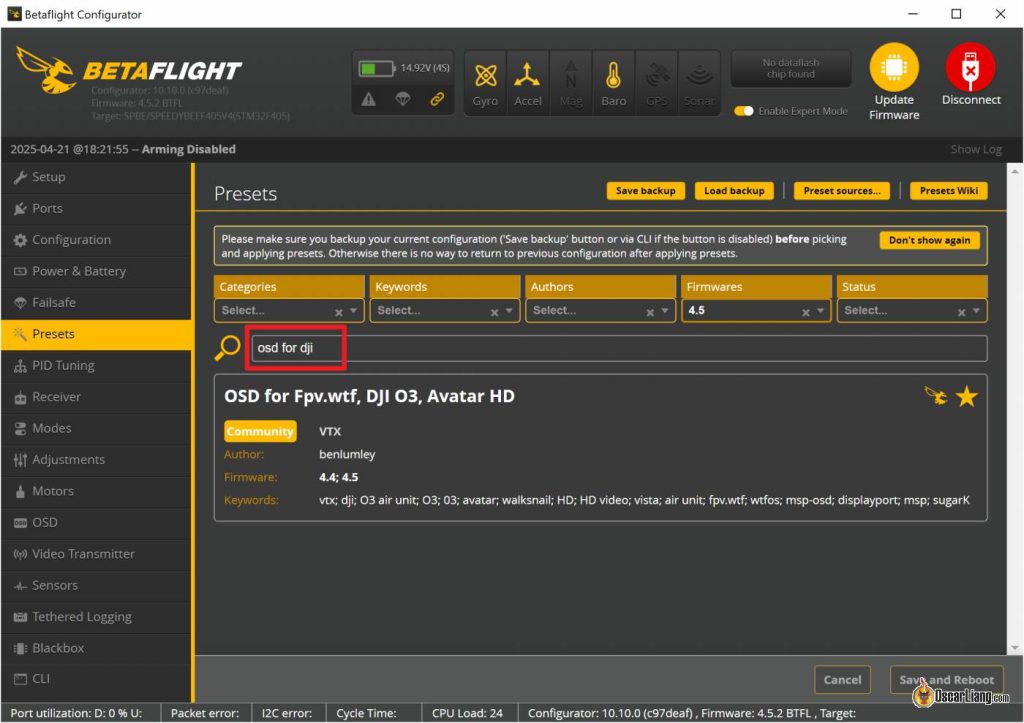16.7K
On this complete tutorial, I’ll stroll you thru the method of constructing an FPV drone from scratch, offering detailed steerage for each analogue and digital FPV methods. We’ll cowl the whole lot from choosing the suitable parts, to wiring and meeting, and even share insider ideas and tips to make sure you have a dependable and pleasant FPV drone expertise.
A number of the hyperlinks on this web page are affiliate hyperlinks. I obtain a fee (at no further value to you) if you happen to make a purchase order after clicking on certainly one of these affiliate hyperlinks. This helps help the free content material for the neighborhood on this web site. Please learn our Affiliate Hyperlink Coverage for extra info.
Can Novices Construct FPV Drones?
Completely! Even when you’ve got no prior expertise, rookies can completely construct FPV drones.
Certain, it may be tempting to easily purchase a ready-made drone off the shelf—however the place’s the enjoyable (and studying) in that? By assembling your personal drone from scratch, you’ll acquire beneficial hands-on information about every part and the way all of them work collectively. You’ll even be a lot better ready to troubleshoot and restore your drone if something goes fallacious.
Now, I gained’t sugar-coat it—constructing your first FPV drone will likely be difficult. It might take hours, and even days, to finish. Alongside the way in which, you’ll want to hunt recommendation from skilled pilots on-line or determine issues out via trial and error. However belief me—the sense of accomplishment and the abilities you acquire will make the journey extremely rewarding.
So, let’s dive in and embrace the challenges forward!
Mastering the Fundamentals
Earlier than we embark on this thrilling tutorial, it’s essential to familiarize your self with the fundamentals of a quadcopter.
To get began, try our beginner-friendly information: Getting Began with FPV Drone.
As you discover the world of FPV, you’ll seemingly encounter many acronyms and technical phrases. Don’t let these intimidate you! When doubtful, seek advice from our helpful glossary: Decoding Acronyms and Technical Phrases in FPV.
Elements Listing
On this tutorial, we’ll be utilizing the next elements to information you thru the FPV drone constructing course of.
Only a fast observe: the hyperlinks offered are affiliate hyperlinks. Making a purchase order via these hyperlinks gained’t value you something further, however it can earn me a small fee. This help helps preserve the weblog operating and permits me to proceed sharing my ardour for FPV drones with you—thanks!
This explicit construct focuses on the DJI O4 Professional Air Unit. In case you’re excited about constructing an analog FPV drone, try my different construct log right here: https://oscarliang.com/how-to-build-fpv-drone-analog/
If in case you have a small price range, right here is an inventory of the most cost effective 5″ drone elements.
If you would like extra choices, right here is an inventory of elements that I like to recommend.
Body
The body is the sturdy construction that holds all the drone’s parts collectively.
For this tutorial, I’ve chosen the GEPRC Vapor—a wonderful alternative due to its excessive construct high quality. It additionally comes with a wide range of 3D-printed equipment, making for an extremely simple and clear construct.
Take a look at my detailed evaluation of this body, together with step-by-step meeting directions, right here: https://oscarliang.com/geprc-vapor-x5-d5-frame/.
FC and ESC
Shopping for the flight controller (FC) and ESC collectively as a stack just isn’t solely extra inexpensive, but it surely additionally ensures that they’re plug-and-play proper out of the field, making the drone constructing course of a lot smoother and extra simple.
For this tutorial, I’ve chosen the Speedybee F405 V4 stack. Regardless of being some of the inexpensive FC/ESC stacks available on the market, it doesn’t compromise on options. It helps virtually all trendy functionalities you’d need in an FPV drone. Take a look at my in-depth evaluation of the Speedybee F405 V4 right here: https://oscarliang.com/speedybee-f405-v4/.
If the Speedybee F405 V4 is out of inventory, don’t fear—there are many glorious options. Right here’s an inventory of my high suggestions: https://oscarliang.com/flight-controller/#The-Greatest-FC-Suggestions.
Motors
FPV motors at present are surprisingly comparable when it comes to efficiency, particularly on the newbie stage. Meaning there’s no want to purchase the costliest motors once you’re simply beginning out—most individuals wouldn’t even discover the distinction. Funds choices just like the EMAX ECO II sequence are greater than sufficient for rookies.
For a 5-inch FPV drone, motor sizes corresponding to 2306, 2207, and 2208 are all viable selections. Personally, I imagine 2207 hits the candy spot when it comes to performance-to-weight ratio. Study extra in regards to the variations right here: https://oscarliang.com/2306-2207-mini-quad-motor/
One other vital issue to contemplate is motor KV, which is linked to your battery voltage. For a 6S construct, I like to recommend selecting motors with a KV score between 1600 and 2000. Increased KV motors ship extra aggressive and power-hungry efficiency. On this construct, I’ve chosen 1900KV motors, as the following decrease choice (1700KV) feels a bit too low for my style.
There are a lot of different glorious motors value contemplating—try my full record of suggestions right here: https://oscarliang.com/motors/#Suggestions
FPV Setup
There are a number of FPV methods accessible available on the market, however the DJI O4 Professional could be my best choice for a 5-inch freestyle drone. It provides the very best picture high quality and sign reliability, and top-notch construct high quality. If you wish to be taught extra in regards to the completely different FPV methods and their execs and cons, try my purchaser’s information: https://oscarliang.com/fpv-system/
Radio Receiver
Your alternative of radio transmitter dictates the kind of receiver (RX) you should use. In case you adopted my radio suggestions, your radio ought to help ExpressLRS (ELRS), which is presently my best choice for a radio hyperlink. ExpressLRS is inexpensive, high-performance, and extremely dependable: https://oscarliang.com/expresslrs/
Quite a few producers produce receivers and transmitter modules for ExpressLRS. You possibly can select any of those, and so long as they’re ExpressLRS, they’ll work collectively. For this tutorial, I’ve chosen the BetaFPV ELRS 2.4GHz Nano, which is without doubt one of the cheaper choices available on the market and works nicely.
That can assist you arrange ExpressLRS, I’ve put collectively a step-by-step tutorial: https://oscarliang.com/setup-expresslrs-2-4ghz/
To fly a quadcopter in FPV, you’ll want the next equipment. Check out my on a regular basis gear for inspiration. Here’s a abstract:
Instruments and Provides
To construct the drone, you’ll additionally want the next instruments and provides. It’s possible you’ll have already got a few of these gadgets, if not, they need to be simply discovered on-line or at your native ironmongery store.
Important:
Optionally available however beneficial:
For these really passionate in regards to the passion, right here’s a complete record of instruments that you could be discover invaluable in your FPV drone-building journey.
Steps of Constructing FPV Drone
Click on the hyperlink will take you to the part on this article:
1. Body Meeting
Observe my detailed step-by-step tutorial to assemble the GEPRC Vapor body: https://oscarliang.com/geprc-vapor-x5-d5-frame/
You have to full the body meeting to this stage earlier than transferring on to the following steps.
2. Putting in Motors
Now, it’s time to mount the 4 motors onto the arms.
The EMAX ECO II motors include screws of various lengths. Use the screws with a 7mm thread size, that are appropriate for 5mm thick arms.
It’s extremely beneficial to make use of threadlocker (corresponding to Loctite) on the motor screws, as vibrations may cause them to loosen over time.
Some motors include threadlocker pre-applied (showing as a blue coating on the threads), however the ECO II motors don’t, so that you’ll want to use it your self.
Some builders use solely three screws and even two to save lots of weight, however I like to recommend utilizing all 4 screws for optimum sturdiness.
Vital: Earlier than absolutely tightening the motor screws, ensure they aren’t too lengthy and aren’t urgent in opposition to the motor windings. In case you’re not sure, observe this information: https://oscarliang.com/check-motor-screws-touching-winding/
3. Wiring Diagrams
In case you’re utilizing the parts I beneficial, seek advice from this wiring diagram for steerage.
Earlier than slicing and soldering any wires, you may “dry match” all of the parts within the body. This course of permits you to gauge how lengthy the wires must be, decide the very best location to your parts, and determine any potential spacing points.
4. Putting in ESC
Begin by putting in the 4 lengthy bolts that include the Vapor body into these holes.
Slide the 4in1 ESC and FC boards onto the bolts.
Usually, the ESC’s energy pads (+ and -) ought to face the rear. Nevertheless, as a result of the Vapor body routes the battery lead via the center, it’s finest to rotate the ESC 180 levels. This implies you’ll must remap the motor order later in Betaflight (don’t fear, I’ll clarify how).
Examine rigorously, nothing ought to contact between the underside of the ESC and the body, and between the ESC and FC boards.
Subsequent, we’ll solder the motors to the ESC. In case you’re new to soldering, seek advice from the tutorial “Methods to Solder for Novices“.
There are three frequent methods to route and solder motor wires:
- Easy and informal routing: Simply solder the wires on to the ESC pads. It’s quick and simple, however the construct gained’t look as clear. In case you are not good with soldering, do that.
- Neat routing round stack screws: Wires loop neatly across the screws. Seems to be cleaner however barely heavier on account of longer wires (a number of further grams).
- Tight, stacking routing (my favourite): Wires are minimize as quick as doable. Very clear aesthetic, however tougher to solder because the wires are stacked on high one other.
Safe the motor wires on the arms with material tape or electrical tape. The Vapor body package contains plastic tubes for wire safety, they do look neat {and professional}, however I discovered them impracticable and heavy.
Measure and minimize motor wires, it’s at all times higher to depart a little bit slack.
Strip about 2mm off the tip of the wires and tin the ends.
Tin all of the motor pads on the 4in1 ESC (fill the pads with a pleasant dome of solder first earlier than soldering the wires).
Don’t fear in regards to the order of the motor wires—you may simply reverse motor spin route later in Betaflight.
Now, solder the capacitor that comes with the Speedybee stack. Insert the offered heatshrink tubes, shorten and bend the legs.
Solder the capacitor onto the battery pads (+ and -) on the ESC. Take note of polarity – the damaging leg is marked by a light-colored stripe on the capacitor.
Why a Capacitor?
A capacitor reduces voltage spikes and electrical noise from the motors and ESC, defending your electronics in addition to decreasing noise attending to the gyro, bettering the flight efficiency of your drone. Study extra about why capacitors are vital: https://oscarliang.com/capacitors-mini-quad/
The capacitor can now sit securely contained in the included TPU mount.
Now, solder the XT60 energy result in the facility pads on the ESC, take note of polarity (constructive and damaging). That is maybe essentially the most difficult step on this construct, as a result of quantity of warmth required to soften the solder on the massive copper pads and thick wires. Be affected person and use a better temperature in your iron.
Soldering Suggestions:
- Use an excellent quantity of solder and solder flux (solder paste) for the massive pads, making certain the solder joints are shiny and full. In case you can see the wire strands, you haven’t utilized sufficient solder.
- Apply extra flux if the solder “sticks” to the tip once you take away it from the joint.
- Be happy to make use of a excessive temperature when soldering massive solder pads, however be fast and keep away from overheating the pads for too lengthy. Use 450°C (840°F) for motor wires and XT60, and 380°C for sign wires.
5. Testing ESC and Motors
We are going to now take a look at the ESC and motors by connecting the battery.
However earlier than plugging in a LiPo battery for the primary time, guarantee there are not any electrical shorts. Utilizing a multimeter in continuity mode, take a look at the constructive and damaging terminals of the XT60 (or instantly on the ESC energy pads). If there’s a quick circuit, the multimeter will beep constantly. On this case, don’t plug within the battery, as it could harm your parts. As an alternative, troubleshoot and repair the difficulty that’s inflicting the quick circuit.
For extra info on utilizing a multimeter to check your drone, try this tutorial.
Professional-Tip: A brief beep adopted by silence might happen when testing continuity on account of capacitors charging. That is regular and shouldn’t trigger concern. So long as it stops beeping after a second or two you need to be tremendous.
Now, join the FC to the ESC utilizing the offered 8-pin cable, and join the FC to your pc by way of a USB cable.
It’s extremely beneficial to make use of a smoke stopper when plugging in a battery for the primary time. Whereas not obligatory, it’s a helpful funding to keep away from damaging parts.
Don’t placed on propellers but.
To check the motors, plug within the battery and join the USB cable to the flight controller. Open Betaflight Configurator, and go to the Motors tab.
Select DShot300 in ESC Protocol. Click on Save and Reboot.
Now, allow motor management, and you must have the ability to spin up the motors – do that one after the other, transfer the slider to round 1100 is sufficient.
You wan to ensure the motor that’s spinning matches the quantity within the diagram, e.g. motor #1 is the rear proper, motor #2 is entrance proper and so forth.
If the motor order is fallacious (most definitely fallacious as a result of we rotated the ESC 180 levels in our construct), you may simply repair it by clicking the “Reorder Motors” button within the motors tab, and simply observe the straightforward directions. It’s also possible to repair it utilizing CLI instructions but it surely’s fairly sophisticated, so simply use the software 🙂
As soon as the motor order is appropriate, it’s worthwhile to confirm if they’re spinning within the appropriate route. To reverse a motor route, there are a number of methods, the simplest is to use the Betaflight Configurator (Motors tab) as defined right here.
Troubleshooting ideas:
- If motors aren’t spinning, make sure the battery is linked and also you’ve turned on the Quick Saver if you’re utilizing it. And the ESC ought to beep as quickly as you plug within the battery. Make sure that the ESC is linked to the FC, and that the pin connections are appropriate.
- If all motors spin aside from one, that individual ESC, motor, or the ESC sign from the FC may be defective. To troubleshoot, swap the non-functioning motor with a working one on the identical quad to find out if the difficulty lies with the ESC or motor.
For additional help, ask within the discussion board: https://intofpv.com
6. Receiver Setup
Begin by soldering the offered wires to the receiver.
Whereas the wire colours technically don’t matter, following a constant colour scheme makes troubleshooting a lot simpler. I like to recommend utilizing this colour coding:
- Black wire → GND (G)
- Pink wire → 5V (V)
- White wire → TX (T)
- Yellow wire → RX (R)
The body features a TPU holder the place you may neatly put the receiver in.
Wire the flight controller to the receiver like this (from FC to receiver):
- 4V5 → V (5V)
- G → G (Floor)
- T6 → R (Receiver RX)
- R6 → T (Receiver TX)
Mount the receiver and antenna securely contained in the body like this.
Now, bind your radio to the receiver by following this tutorial: https://oscarliang.com/bind-expresslrs-receivers/.
As soon as that’s performed, we are able to arrange the receiver in Betaflight configurator:
- Go to the Ports tab and allow “Serial RX” for the UART linked to the receiver (UART6 in our instance, as a result of we linked it to T6 and R6). Click on Save.
- Within the Receiver tab, choose “Serial (by way of UART)” in Receiver Mode and select “CRSF” in Serial Receiver Supplier. Allow Telemetry. Click on Save.
After this, the receiver must be working. To substantiate, go to the Receiver tab, and the bars (channel values) ought to change once you transfer the sticks on the radio. If the fallacious channels are responding, attempt a unique Channel Map corresponding to “default (AETR)” or “TAER”.
You will have to setup switches on the radio for arming, flight modes and beeper. Observe this tutorial to learn the way: https://oscarliang.com/setup-switch-mixes/
If in case you have any questions, put up within the discussion board: https://intoFPV.com
7. Putting in DJI O4 Professional
Connecting the DJI O4 Professional Air Unit to the Speedybee flight controller couldn’t be easier—simply plug within the offered cable and also you’re good to go. The O4 Air Unit will likely be mounted on high of the receiver.
Push the 2 O4 Professional antennas securely into the holes within the rear TPU antenna mount.
In case you’re controlling the drone utilizing ExpressLRS, you could wish to take away the SBUS and GND wires from the O4 connection cable. These wires are supposed for the DJI distant controller, and leaving them linked may cause conflicts if you happen to’re utilizing the identical UART for an additional system.
Mount the digital camera between the silicone dampers included with the body.
In case you’re new to flying, you would possibly wish to begin with a decrease digital camera tilt angle like 10° to fifteen°. As you turn out to be extra snug and begin flying quicker, you may enhance the lean to twenty° and even 30° for higher ahead visibility at velocity.
Now we’ll configure OSD (On-Display screen Show) to indicate vital flight information like battery voltage, flight time, and warnings instantly in your DJI goggles.
I’ve a full step-by-step information right here if you’d like extra element: https://oscarliang.com/how-to-setup-dji-o4-pro/
To summarize the method:
- In Betaflight Configurator, go to the Presets tab.
- Seek for “OSD for DJI”.
- Choose the preset you discover.
- Within the choices, choose “map to displayport”, “set HDOSD”, and the UART you’ve linked the O4 to (in our instance that’s UART1).
- That’s it.
Now, head to the OSD tab, allow your favorite parts and transfer them round as you want. Ensure you’ve chosen HD beneath Video Format so you might be utilizing all of the display screen area accessible. I’ve my very own OSD layouts if you wish to copy: https://oscarliang.com/betaflight-osd/#My-OSD-Setup-CLI-Instructions
8. Ending Off
Safe the flight controller (FC) with nylon nuts.
Tighten solely by hand to keep away from over-compressing the rubber grommet because it might scale back vibration damping and defeat the aim of sentimental mounting.
Subsequent, set up the highest plate.
Listed below are the weights of the finished drone:
- Drone together with propellers and battery strap: 453g
- Drone + 6S 1100mAh LiPo: 645g
- Drone + 6S 1100mAh LiPo + GoPro 13: 802g
When putting in the propellers, take note of the completely different rotations—CW (clockwise) and CCW (counter-clockwise). Guarantee they’re put in on the proper motors; in any other case, your quad might not take off or might flip over when attempting to.
Use M5 nylon lock nuts to carry the propellers securely on the motor. Tightening may be difficult at first however will turn out to be simpler over time. Keep away from overtightening to forestall prop hub shattering. Tighten simply sufficient so the prop can’t transfer once you attempt to rotate it together with your hand whereas holding the motor bell.
A devoted prop nut software can velocity up prop adjustments.
When mounting the battery (and GoPro), make sure the COG (middle of gravity) is as near the drone’s middle as doable. To test if the battery is positioned appropriately, seize the center of the highest plate with two fingers and see if the quad stays stage. It’s important to take care of the COG on the middle of the 4 motors. For example, if the quad is front-heavy, the entrance motors will work tougher than the rear motors when attempting to take care of its place, negatively impacting flight efficiency.
And we’re prepared for a take a look at flight!
9. Setting Up Betaflight
We’ve already coated a lot of the Betaflight setup throughout this construct. Nevertheless, to double-check the whole lot and guarantee nothing is missed, observe my full newbie’s tutorial right here: https://oscarliang.com/betaflight-firmware-setup/
10. Tuning
Tuning your quadcopter includes adjusting it to fly and behave the way in which you need. Betaflight has come a great distance; you don’t must tune your quad, and it’ll seemingly fly simply tremendous with inventory settings. Nevertheless, if you happen to’re critical about efficiency, there’s extra to be taught!
For most individuals, tuning an FPV drone includes adjusting these settings:
Tuning is sort of technical and typically includes using Blackbox logs. In case you don’t know find out how to use Blackbox, that is find out how to tune your FPV drone in 10 easy steps. In case you’re acquainted with Blackbox, try this in-depth information on tuning filters and PID.
Earlier than tuning, although, I’d advocate flashing Bluejay firmware to the ESC if they arrive with BLHeli_S firmware, it provides you with higher efficiency. When doing so, you’ll want to decide on between the 24kHz or 48kHz variations. The 24kHz model gives higher responsiveness and torque, whereas the 48kHz model provides smoother flight with barely much less torque. I like to recommend 48KHz. It’s also possible to allow bi-directional Dshot, and activate RPM filter when you’ve flashed Bluejay. It’s among the best filters accessible in Betaflight and makes your quad flies higher.
I’ll share my PID and Filter tune for this construct in my Patreon shortly, if you wish to attempt my tune, take into account subscribing: https://oscarliang.com/patreon-support-announcement/
11. Studying Methods to Fly
If in case you have little to no expertise flying a mini quad, take into account testing these tutorials to get began:
If in case you have any questions, be at liberty to ask within the feedback.
You possibly can test my previous construct guides (some information is outdated):





